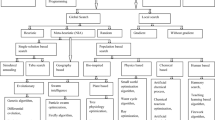Abstract
Reference point based multi-objective evolutionary algorithm by decomposition (RMEAD) considers reference points as users’ preferences. RMEAD not only focuses on searching the region of interest to find a set of preferred solutions, but also economizes a significant amount of computing resources. However, the base weight vectors in RMEAD may not be well estimated when confronting to hard multi-objective optimization problems. This paper modifies RMEAD to improve its performance on two aspects: firstly, a novel and simple approach to finding the base weight vectors is developed, the correctness of which is proved mathematically; secondly, a new updating weight vectors method is proposed. Abundant experiments show that the improved RMEAD (IRMEAD) could obtain significantly better results than RMEAD on all the test cases in terms of convergence and diversity. Besides, compared with recent proposed preference-based approach MOEA/D-PRE, IRMEAD outperforms it on most of the test instances.










Similar content being viewed by others
References
Zhou B, Qu Y, Li H, Zhao SZ, Suganthan PN, Zhang Q (2011) Multiobjective evolutionary algorithms: a survey of the state of the art. Swar Evol Comput 1(1):32–49
Coello CAC (2006) Evolutionary multi-objective optimization: a historical view of the field. IEEE Comput Intel Mag 1(1):28–36
Zhu H, He Z, Jia Y (2015) A novel approach to multiple sequence alignment using multi-objective evolutionary algorithm based on decomposition. IEEE J Biomed Health. doi:10.1109/JBHI.2015.2403397
Deb K, Pratap A, Agarwal S, Meyarivan T (2002) A fast and elitist multiobjective genetic algorithm: nSGA-II. IEEE Trans Evolut Comput 6(2):182–197
Zitzler E, Laumans M, Thiele L (2001) SPEA2: improving the strength pareto evolutionary algorithm. Technical report no 103. Swiss Federal Institute of Technology, Zurich
Xia H, Zhuang J, Yu D (2014) Combining crowding estimation in objective and decision space with multiple selection and search strategies for multi-objective evolutionary optimization. IEEE Trans Cyber 44(3):378–393
Wang X, Dong L, Yan J (2012) Maximum ambiguity based sample selection in fuzzy decision tree induction. IEEE Trans Knowl Data Eng 24(8):1491–1505
Fonseca CM, Fleming PJ (1994) Genetic algorithms for multiobjective optimization. Formulation, discussion and generalization. Aust Electron Eng 27(2):416–416
Coello CAC (2000) Handling preferences in evolutionary multiobjective optimization: a survey. In: Proceeding of the IEEE CEC, pp 30–37
Rachmawati L, Srinivasan D (2006) Preference incorporation in multi-objective evolutionary algorithms: a survey. In: Proceeding of the IEEE CEC, pp 954–960
Branke J, Kaussler T, Schmeck H (2001) Guidance in evolutionary multi-objective optimization. Adv Eng Softw 32(6):499–507
Cvetkovic D, Parmee IC (2002) Preferences and their application in evolutionary multiobjective optimization. IEEE Trans Evolut Comput 6(1):42–57
Deb K, Sundar J (2006) Reference point based multi-objective optimization using evolutionary algorithms. In: GECCO, pp 635–642
Miettinen KM (1999) Nonlinear multiobjective optimization. Kluwer Academic, Boston, pp 155–159
Thiele L, Miettinen K, Korhonen PJ, Molina J (2009) A preference-based evolutionary algorithm for multi-objective optimization. Evol Comput 17(3):411–436
Molina J, Santana LV, Hernandez-Diaz AG, Coello CAC, Caballero R (2009) g-dominance: reference point based dominance for multiobjective metaheuristics. Eur J Oper Res 197(2):685–692
Said LB, Bechikh S, Ghedira K (2010) The r-dominance: a new dominance relation for interactive evolutionary multicriteria decision making. IEEE Trans Evolut Comput 14(5):801–818
Zhang Q, Li H (2007) MOEA/D: a multiobjective evolutionary algorithm based on decomposition. IEEE Trans Evolut Comput 11(6):712–731
Tan YY, Jiao YC, Li H, Wang XK (2012) A modification to MOEA/D-DE for multiobjective optimization problems with complicated Pareto sets. Inf Sci 213:14–38
Gong MG, Liu F, Zhang W, Jiao L, Zhang Q (2011) Interactive MOEA/D for multi-objective decision making. In: GECCO, pp 721–728
Deb K, Sinha A, Korhonen PJ, Wallenius J (2010) An interactive evolutionary multiobjective optimization method based on progressively approximated value functions. IEEE Trans Evolut Comput 14(5):723–739
Mohammadi A, Omidvar MN, Li X (2012) Reference point based multi-objective optimization through decomposition. In: Proceeding of the IEEE WCCI, pp 1–8
Wang R, Zhang T, Guo B (2013) An enhanced MOEA/D using uniform directions and a pre-organization procedure. In: Proceeding of the IEEE CEC, pp 2390–2397
Gu F, Liu HL, Tan KC (2012) A multiobjective evolutionary algorithm using dynamic weight design method. Int J Innov Comput Inf Control 8(5):3677–3688
Zitzler E, Deb K, Thiele L (2000) Comparison of multiobjective evolutionary algorithms: empirical results. Evol Comput 8(2):173–195
Deb K, Thiele L, Laumanns M, Zitzler E (2002) Scalable multi-objective optimization test problems. In: Proceeding of the IEEE CEC, pp 825–830
Zhang Q, Zhou A, Zhao S, Suganthan P, Liu W, Tiwari S (2009) Multiobjective optimization test instances for the CEC 2009 special session and competition. Special session on performance assessment of multi-objective optimization algorithms. Technical report, University of Essex, Colchester
Mohammadi A, Omidvar MN, Li X (2013) A new performance metric for user-preference based multi-objective evolutionary algorithms. In: Proceeding of the IEEE CEC, pp 2825–2832
Yu G, Zheng J, Shen R, Li M (2015) Decomposing the user-preference in multiobjective optimization. Soft Comput. doi:10.1007/s00500-015-1736-z
Acknowledgments
This work was supported in part by the china science and technology project of ministry of transport under Grant 2011318740240 and by the Chongqing graduate education reformation research project under the no. yjg133005.
Author information
Authors and Affiliations
Corresponding author
Rights and permissions
About this article
Cite this article
Zhu, H., He, Z. & Jia, Y. An improved reference point based multi-objective optimization by decomposition. Int. J. Mach. Learn. & Cyber. 7, 581–595 (2016). https://doi.org/10.1007/s13042-015-0443-5
Received:
Accepted:
Published:
Issue Date:
DOI: https://doi.org/10.1007/s13042-015-0443-5




